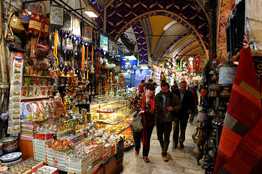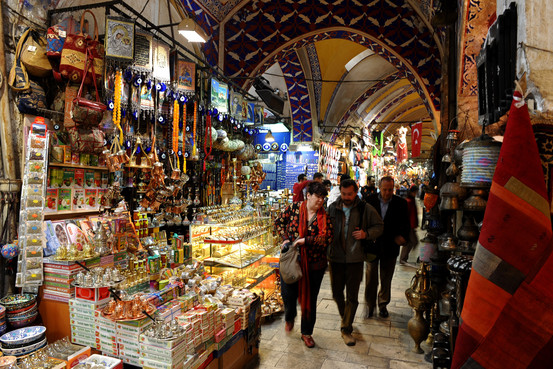In Istanbul’s Rowdy Bazaars, Police Say ‘Shhh’ and Some Whisper, Is the City Losing Its Soul?
Turkish bazaars are a noisy place, with vendors straining to out shout, and out sell each other. But new laws are making vendors turn down the volume, and leave any crude references out of their sales pitches.
ISTANBUL — “Tomatoes! Get your tomaaaatoes!” Spend your money here, because you’re not going to take it to the afterlife,” yells Hakan Gursu, a 23-year old vegetable seller in one of this city’s many historic, cacophonous bazaars. “Shouting is the joy of the bazaar,” he adds.
Turkey’s shout police might disagree with that.

Getty ImagesPeople stroll past colorfull merchandise inside the Grand Bazaar in April 2009 in Istanbul, Turkey.

Joe Parkinson / The Wall Street JournalIzzettin Ozel, a 42-year-old trader who was fined for shouting too loud.
For centuries, traders in Turkey’s covered-market bazaars have been perfecting their pitch—famously hollering, singing or otherwise trumpeting their wares. But now an obscure provision of a new law is seeking to turn down the volume.
Since January, the wardens who patrol Istanbul’s 350 or so street markets, including the storied Grand Bazaar, have had a new mandate: Silence traders who get too loud or too rude.
Stall owners face fines up to 500 Turkish liras ($280) if they “disturb the environment” or perform “verbal or genuine abuse” against shoppers. Serial bellowers can be evicted from their stalls. In Fatih market, where traders have been haggling since the 14th century, one warden said he had issued penalty notices to more than 100 traders in the past six weeks.
Izzettin Ozel, a 42-year-old self-confessed shouter who has hawked fruit and vegetables here in Fatih market for two decades, discovered his sales pitch was too loud to be legal only when a fine for 169 liras arrived in the mail last month.
“You can’t stop shouting at the bazaar. There’s no meaning to just standing here quietly,” he says, surrounded by kiwi fruit and bananas. “Selling is more fun when you shout, plus the sales are higher.”
Some traders are hiring young lookouts to prowl the bazaar and warn stall owners if wardens are lurking. Others, hoping to dodge penalties but still keen to attract shoppers’ attention, have replaced shouting with elaborately trilled whistling.
And plenty simply ignore the rules. One Sunday this month, vegetable sellers at Tarlabasi market in Istanbul’s Beyoglu district sang an ode to their fresh peppers: “Take iiit, don’t regret iiit.” Others loudly implored women to buy “Turkey’s best ‘twins’ hats,'” using a slang term for brassieres.
As stall owners shout in defiance and trill their way through loopholes, Turkey’s governing Justice and Development Party has proposed more rules. New measures demand that stall owners “pay attention to the cleanliness of their hands and faces” and sign forms declaring they aren’t carrying contagious diseases. These proposals are expected to pass into law later this year.
Municipal officials say the pursuit of quietude and cleanliness in the bazaar is part of a European Union-inspired effort to bring more order to street markets across Turkey. The mayor of Fatih municipality, which houses the city’s largest street market—where some 5,000 stalls jostle for attention—insists shoppers want a bazaar free from yells and expletives.
“We understand the importance of shouting in the bazaar, but it shouldn’t be too disturbing; we have to work out a compromise,” says Mustafa Demir, in his office on the European side of Istanbul. “We don’t plan to be too tough,” he says.
Some shoppers say that, in recent years, the shouts have become more uncouth, with an increase in swearing and sexual innuendo. Women have reported being harassed by sellers calling out suggestive rhymes, for instance, as they weigh whether to buy bananas or peaches.
Traders concede that the more vociferous among them sometimes shout loudly or suggestively. Still, official calls for restraint have fallen on deaf ears among many stall-keepers, who argue that the restrictions represent the latest in a series of attacks on their livelihood.
![Please Be a Little More Quiet When Shouting at Your Customers 3 [TURKSHOUT]](http://sg.wsj.net/public/resources/images/HC-GQ714_TURKSH_BV_20120513170508.gif) Fatih police patch
Fatih police patch
“A few of my friends don’t come here anymore because they are worried about getting fined,” says Bulent Atalay, whose neighboring stallholder left his space after being fined for calling out to a passerby. “The government wants our markets to close, but they won’t succeed,” he says.
If Turkey’s bazaars are under attack, perhaps it is by shopping malls as much as anything. Istanbul is brimming with malls, and they are taking a bite out of business at the traditional bazaars. By the end of next year, there will be an estimated 275 square meters of mall space to lease for every 1,000 Istanbul inhabitants, or 15% more than the EU average, according to real-estate investment firm Jones Lang LaSalle.
Still, the shopping-mall culture hasn’t killed the bazaars, which still throng with bargain hunters. Nor have the new noise rules managed to silence traders’ shouts, which still reverberate across the city, proclaiming the virtues of tea cups or tomatoes, eggs or underwear.
Shoppers seem to be split on whether less shouting would be good or bad. Esra Kutag, who says she often gets hassled by overzealous stall owners when visiting the bazaar every two weeks with her mother, says she welcomes the noise regulations.
 “You know, the shouting is sometimes just too much. They shout ‘come! come!’ after you, even if you don’t want to buy,” she says. “Its uncomfortable; they kind of stick to you.”
“You know, the shouting is sometimes just too much. They shout ‘come! come!’ after you, even if you don’t want to buy,” she says. “Its uncomfortable; they kind of stick to you.”
Then there are those who are firmly allied with the noisemakers. Suppressing the yelling and song steals what Murat Ulgen, who was shopping for tomatoes one day recently, describes as “the soul of Istanbul.”
“Sure, we can go to supermarkets, but it’s more expensive and everywhere it’s the same, he says. “Yeah we’re getting richer, but we don’t have to forget where we came from.”
—Ayla Albayrak contributed to this article.
